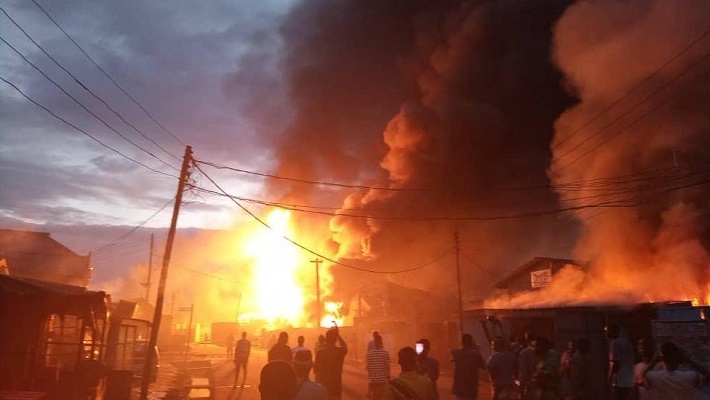

In a terrifying turn of events that shook the heart of Lagos on Sunday afternoon, a gas explosion erupted in the densely populated Ijora Badia area of the Apapa Iganmu Local Council Development Area, leaving at least 15 people injured and sparking panic among residents.
The explosion, which occurred at approximately 4:10 p.m., was traced to a mini shop situated within a bungalow structure that housed 15 self-contained rooms and seven adjoining shops. The source of the blast was identified as a 25kg gas cylinder, one of five stored within the small commercial outlet. Eyewitnesses described the moment as deafening and chaotic, with flames and smoke quickly engulfing the immediate surroundings.
“It was like a bomb went off,” said one local shopkeeper who narrowly escaped injury. “We heard a loud bang, and then fire burst out. People were screaming and running in every direction. I saw a man trying to carry a child out of the smoke.”
Margaret Adeseye, Director of the Lagos State Fire and Rescue Service, confirmed the incident in a late-night statement. According to her, preliminary investigations revealed that the blast was a result of poor handling of the gas cylinders, which led to a leakage that was tragically ignited by a nearby open flame.
“It was a case of poor handling of gas products, which unfortunately allowed gas to escape and come in contact with a flame. This triggered the explosion,” Adeseye said. She emphasized that while the consequences could have been far more devastating, quick emergency response helped contain the spread of the fire and evacuate remaining cylinders to prevent a secondary disaster.
Within minutes of the explosion, emergency responders from the Sari Iganmu Fire Station arrived at the scene, supported by operatives from the Lagos State Emergency Management Agency (LASEMA), the Lagos Neighbourhood Safety Corps, and the Lagos State Ambulance Service (LASAMBUS). Their swift and coordinated efforts were instrumental in extinguishing the flames, evacuating affected individuals, and securing the area.
While no fatalities were recorded, the human toll remains significant. Fifteen individuals suffered burn injuries, ranging from mild to severe. Some of the injured were treated on-site, while others were transported to nearby hospitals for more intensive medical care. Officials have assured the public that none of the victims sustained life-threatening wounds.
Videos and photos shared by residents and emergency workers showed the aftermath of the explosion: shattered windows, charred walls, scattered debris, and smoke-stained skies. A sense of disbelief and distress loomed over the community as families gathered outside the damaged building, counting their losses and comforting the injured.
“I have lived here for over ten years, and nothing like this has ever happened,” a resident said, still shaken. “We cook with gas every day, but we never thought it could be so dangerous.”
The incident has once again raised urgent concerns over the improper handling and storage of liquefied petroleum gas (LPG) in residential areas. Experts and safety advocates have repeatedly warned against the clustering of high-capacity gas cylinders in confined or densely populated spaces without adequate ventilation, safety equipment, or training.
“What we saw today is the direct consequence of negligence and ignorance,” said a fire safety consultant who visited the scene. “Too many people are running gas refill businesses or using large cylinders in shops without understanding the risks. It only takes one leak and one spark to cause a disaster.”
In recent years, Lagos has witnessed multiple gas-related explosions, many of them resulting in deaths, injuries, and significant property damage. The state government has consistently advocated for adherence to safety standards and guidelines, but enforcement remains a challenge in informal and low-income settlements where regulations are often flouted or poorly communicated.
Following the Ijora Badia explosion, the Lagos State Fire and Rescue Service reiterated its commitment to conducting more safety awareness campaigns, particularly in vulnerable communities. The agency also urged business owners and residents who use gas cylinders to ensure they are properly maintained, securely stored, and never kept near open flames.
Authorities have not announced any arrests or sanctions related to the incident, but investigations are ongoing to determine whether the shop owner had the necessary licenses and safety measures in place. Residents are calling for stricter oversight and preventive measures to avoid a repeat of such a close call.
“This is a wake-up call for everyone,” said a local youth leader. “We cannot keep playing with our lives just because we want to cut corners or save a few naira. Gas is useful, but it is also dangerous. We need education, regulation, and enforcement.”
As night fell over Ijora Badia, the smell of smoke still lingered in the air, and emergency vehicles continued to patrol the area, monitoring for any residual hazards. Community leaders, emergency officials, and state representatives are expected to meet in the coming days to assess the damages and explore longer-term solutions to the problem of unsafe gas use in Lagos.
For now, the community counts its blessings. No lives were lost, and through a rapid emergency response, what could have been a full-scale tragedy was narrowly averted. Still, the scars—emotional, physical, and material—will linger for some time.
The Lagos State Government has encouraged affected individuals to seek support through the appropriate relief and recovery channels, while urging the general public to remain vigilant, report unsafe gas practices, and comply with all safety regulations.
This incident serves as a stark reminder that, in a city as vibrant and bustling as Lagos, safety cannot be taken for granted. One spark is all it takes to turn a regular Sunday into a nightmare.


